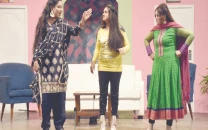The woman who left the Nobel Committee in awe
Do not mistake Alexievich’s work as a record of women’s role in wars

Svetlana Alexievich
War is a phenomenon attributed to men and a woman’s role is usually overshadowed by the massive show of gallantry by her male counterpart.
This is one of the motifs that Svetlana Alexievich — the Belarusian writer who was awarded the Nobel Peace Prize in Literature for the year 2015 — has explored through her work. Her first book, War’s Unwomanly Face, published in 1983, is one such platform where the role played by women in wars is emphasised. Alexievich interviewed over 200 women to chronicle the Soviet war, and spent four long years working on the book, visiting over 100 cities and towns, settlements and villages to record the stories and reminiscences of women war veterans.
These women spoke of how they had dreamt of becoming brides but became soldiers instead and fought on the frontline in the Second World War. More than 500,000 Soviet women participated in what has been deemed as the most gruesome war of the 20th century. “Women not only rescued and bandaged the wounded but also fired a sniper’s rifle, blew up bridges, went reconnoitering and killed… They killed the enemy who, with unprecedented cruelty, had attacked their land, their homes and their children,” reads the book’s prologue.
Read: Nobel Literature Prize to be announced on Thursday
However, do not mistake Alexievich’s work as just a record of the role played by women in wars. Her work is a perfect amalgam of the perils of war and its effects on everyone, be it a child or a man fighting the war on the frontline. She humanises something that everyone has detached themselves from. That is an attribute I hold the nearest to myself, as the true face of war is hidden behind the victor, the fighter and the economical jargon.
War’s psychological aspects are hardly ever discussed in the news. And that is what the Belarusian writer discusses in her books. The Swedish Academy, announcing her win, praised Alexievich’s “polyphonic writings”, describing them as a “monument to suffering and courage in our time”. She is the 14th woman to win the prize since it was first awarded in 1901. She is also the first journalist to win the award.
Building on the momentum of her recent win, the Belarusian Minister for Education Mikhail Zhuravkov announced that Alexievich’s work will be making a comeback to Belarusian curriculum. It would be made mandatory for students in 10th and 11th grade to read Alexievich’s work. However, he said that it would be “inappropriate” for elementary school students to study such “heavy” literature.
Read: Research CIIT, Belarusian universities sign MoU
But whatever the case, hats off to Zhuravkov for including such an important piece of the past in the school cirriculum. Alexievich’s work had disappeared from the compulsory Belarusian curriculum in the early 2000s. Now that it is back, students will have a fair chance at learning about the true face of war — the ugly face that wrecks people’s hearts that nobody wants to talk about.
Published in The Express Tribune, October 18th, 2015.
Like Life & Style on Facebook, follow @ETLifeandStyle on Twitter for the latest in fashion, gossip and entertainment.



















COMMENTS
Comments are moderated and generally will be posted if they are on-topic and not abusive.
For more information, please see our Comments FAQ